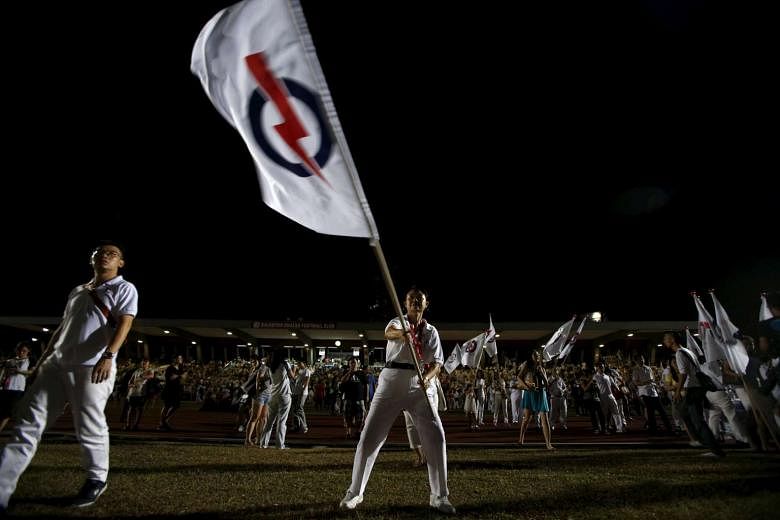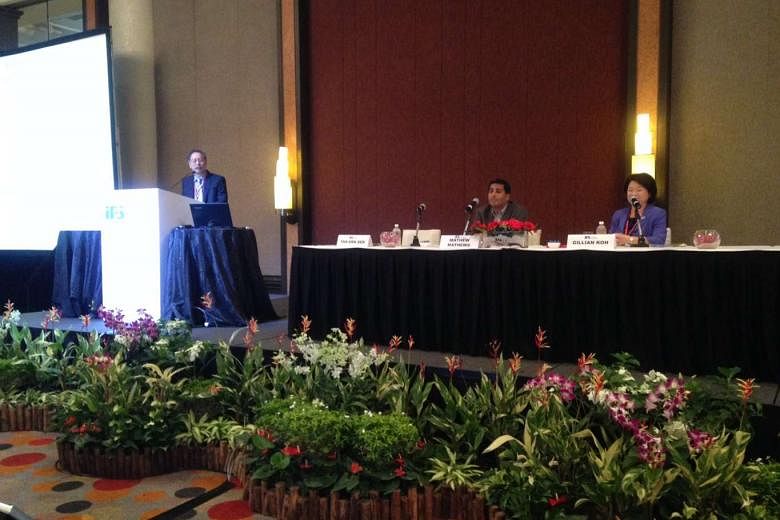SINGAPORE - The nationwide vote swing of 9.8 percentage points to the People's Action Party in the Sept 11 General Election (GE) was likely due to middle- and higher-income earners backing the political status quo, in a shift from the 2011 GE when these groups showed a greater desire for political pluralism.
This is according to a survey by the Institute of Policy Studies, which polled a random sample of 2,015 voting-age Singaporeans. The findings were presented at a post-election conference organised by the think-tank on Wednesday morning (Nov 4).
GE2011 saw the PAP's share of the popular vote fall from 66.6 per cent in 2006 to 60.1 per cent, and the Workers' Party becoming the first opposition party to win a GRC.
In GE2015, the PAP's share of the popular vote rose to 69.9 per cent, to the surprise of many.
IPS, which conducted a similar survey after GE2006 and GE2011, found that while there was a general fall in support for political diversity this time round, the sharpest drop came from those with at least post-secondary education, lower-middle to high-income households, and four-room flat dwellers.
The issues that mattered to voters
The "need for efficient government" was cited as the top priority among a list of 18 issues. About 98 per cent of respondents rated it as "important" or "very important".
This was followed by "amount of government help for the needy", "fairness of government policy" and "cost of living", which at least 90 per cent deemed "important" or "very important".
However, based on comparisons to similar surveys done in 2011 and 2006, even those who were categorised as conservative based on their responses increasingly agree there is a need for checks and balances, and different views in Parliament.
Dr Gillian Koh, a senior research fellow at IPS who led the research team behind the survey, says other factors - such as the government addressing some hot-button issues that affected its vote share in the 2011 GE like high housing prices - may have trumped this desire for political diversity at the ballot box.
She also said some respondents who held liberal views in 2011 could be termed as "conditional pluralists". "They feel that the policies of the Government, the performance of the Government was sufficient for them not to have to strongly believe that there still needs to be diverse views and checks and balances and opposition in Parliament," she said.
"When it comes to finally translating to whether that will be a vote for the opposition, then we're looking at issues, whether policies address issues that voters are concerned about," she added. For these voters, support for pluralism is "actually conditional to whether they feel the incumbent has performed well as a government in terms of its policies and what it was able to deliver".
A closer look at the data, she noted, shows two segments of the population that showed the greatest shift towards the PAP were those aged 21 to 29 and those aged 65 and above. "It's very clear there were specific policies that were targeted at these segments," Dr Koh said.
Cooling measures for the property market introduced after 2011 have made it easier for young couples to buy their new home while the $8 billion Pioneer Generation Package launched last year looks after the healthcare needs of some 450,000 Singaporeans born in 1949 or earlier, and who had also become citizens before 1987.
Opposition still has a role
Even though GE2015 was a blow for the opposition, Dr Koh said there was encouragement to be drawn from the findings as "there is an overall shift towards a greater appreciation of the need for opposition voices, diverse views, and checks and balances in Parliament".
"Clearly what our respondents are saying is there is a role for the political opposition in Singapore today."
The recently concluded election was the first time all seats were contested since independence, and the PAP won 83 out of 89 seats.
Observers have cited such factors as the nation's golden jubilee celebrations in August and the passing of founding prime minister Lee Kuan Yew in March as possible reasons for the PAP's improved performance.
But the IPS survey found that Mr Lee's legacy ranked low on the minds of voters, although it was more important to those born before 1965 and the lower-income group.
The controversy over the Workers' Party-run town council, which had come under fire from PAP leaders since two years before the election, was second-last on the list of issues in the survey. But older voters, especially those 55 and above as well as those earning less were more concerned about this issue than other groups were.
But Dr Koh pointed out that in spite of the town council saga, the credibility of the WP remained high among voters. More than 70 per cent of respondents agreed or strongly agreed that it was a credible party. About 56 per cent of respondents thought the same way in 2011.
As for the qualities that voters want to see in candidates, honesty, fairness, efficiency and empathy continued - as in 2006 and 2011 - to outweigh credentials, grassroots experience and party affliation.



